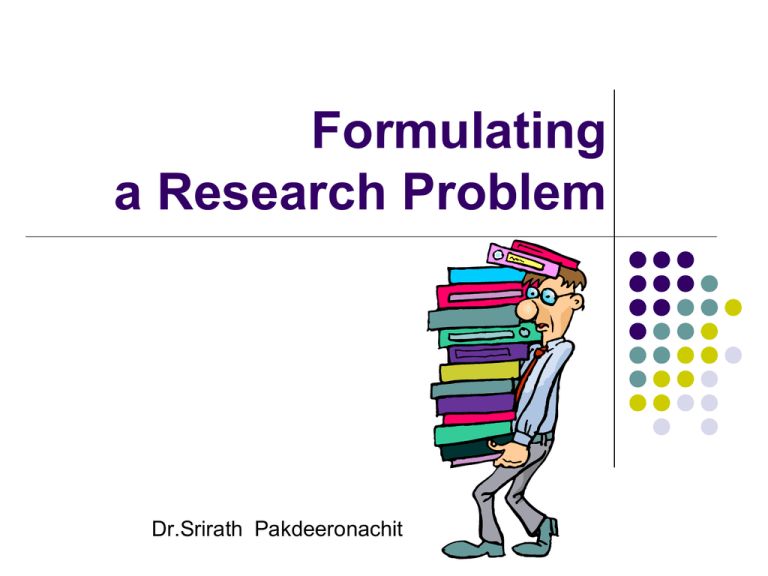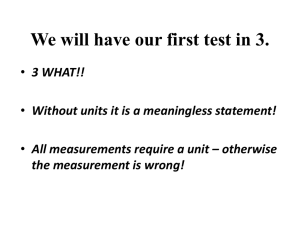Formulating a Research Problem: A Guide
advertisement

Formulating a Research Problem Dr.Srirath Pakdeeronachit The Research Problem No problem, no research A problem that someone would like to research Researchable Power Meenaghan&Twoomney (1985): “Potential research questions may occur to us on a regular basis, but the process of formulating them in a meaningful way is not at all an easy task” Researchable vs. Non-researchable Questions Fraenkel JR, The Importance of formulating a Research Problem Formulating a research problem is the first and most important step of the research process. Identify the destination before taking the journey Research question = Foundation of building The Importance of formulating a Research Problem Research problem determines type of study design type of sampling strategy research instrument type of analysis Sources of Research Problems Journal, article, etc. Personal interest and experiences Deduction from theory Experts Conversation with colleagues or at professional conferences. Observation Literature reviews. Replication of studies Considerations in Selecting a Research Problem Interest Magnitude Measurement of concepts Level of expertise Relevance Availability of data Ethical issues Considerations in Selecting a Research Problem Interest should be the most important consideration keeps the researcher interested in it throughout the research process Magnitude Measurement of concepts Level of expertise Relevance Availability of data Ethical issues Considerations in Selecting a Research Problem Interest Magnitude Not too broad or too big Not too narrow Manageable, specific and clear Measurement of concepts Level of expertise Relevance Availability of data Ethical issues Considerations in Selecting a Research Problem Interest Magnitude Measurement of concepts If a concept is used in the study, Be clear about its indicators and their measurement Level of expertise Relevance Availability of data Ethical issues Considerations in Selecting a Research Problem Interest Magnitude Measurement of concepts Level of expertise fits the level of researcher’s level of research skills, needed resources, and time restrictions Relevance Availability of data Ethical issues Considerations in Selecting a Research Problem Interest Magnitude Measurement of concepts Level of expertise Relevance contributes to the improvement and understanding of educational theory and practice Relevant to your area of professional Availability of data Ethical issues Considerations in Selecting a Research Problem Interest Magnitude Measurement of concepts Level of expertise Relevance Availability of data If you want to collect information from secondary sources (office record, client records, alreadypublished reports), Make sure that these data are available and in the format you want Ethical issues Considerations in Selecting a Research Problem Interest Magnitude Measurement of concepts Level of expertise Relevance Availability of data Ethical issues Do no harm to person/society involved Considerations in Selecting a Research Problem Interest Magnitude Measurement of concepts Level of expertise Relevance Availability of data Ethical issues FUNDABLE!!! Steps in Formulation of a Research Problem Step I: Identify a broad field or subject area of interest to you Step II: Dissect the broad area into subareas Step III: Select what is the most interest to you Step IV: Raise research question Step V: Formulate objectives Step VI: Assess your objectives Step VII: Double-check The Formulation of Objectives Objectives are the goal you set out to attain in your study Should be listed under 2 headings Main or overall objectives - overall statement Sub- or specific objectives - clearly listed and unambiguously Usually use the action words such as to study, to analyze, to explore, to assess, to interpret, to develop, to elucidate, to identify, to articulate, to establish, to construct, to propose, to argue, to compare The Formulation of Objectives Objectives are the goal you set out to attain in your study Should be listed under 2 headings Main or overall objectives - overall statement of the study Sub- or specific objectives - specific aspects of the topic that you want to investigate clearly listed and unambiguously The Formulation of Objectives Usually use the action-oriented words such as to study, to analyze, to explore, to assess, to interpret, to develop, to elucidate, to identify, to articulate, to establish, to construct, to propose, to argue, to compare Examples of Objectives To describe the major treatment program provided by Siriraj hospital to alcoholics in Bang Plad Area (descriptive research) To ascertain the impact of migration on family roles (correlational research) To compare the effectiveness of different teaching methods on the comprehensive students (correlational research) To ascertain if an increase in youth unemployment will increase the incidence of street crime (to test a hypothesis) Defining Terms in Research 3 common ways to clarify ambiguous or unclear terms in research question involve the use of Constitutive (dictionary-type) definition Definition by example Operational definition Defining Terms in Research Constitutive (dictionary-type) definition Use additional terms to clarify the meaning Operational definition Describes how examples of a term are to be measured or identified Defining Terms in Research Important to develop, define or establish a set of rules, indicator in order to clearly establish the meaning of such words/items Important to define clearly the study population from which you need to obtain the required information Example of Establishing Operational Definitions Main objective – to find out the number of children living below the poverty line in Bangkok Define the word “poverty line” Define the word “Children” Key Terms to Define in a Research Study Terms necessary to ensure that the research question is sharply focused Terms that individuals outside the field of study may not understand Terms that have multiple meanings Terms that are essential to understanding what the study is about Terms to provide precision in specifications for instruments to be develpoed










